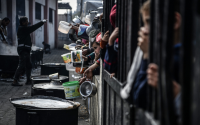BBC News, Wednesday, 26 September, 2001
A year since the outbreak of the intifada, living standards among Palestinians have fallen dramatically.
Israel's stranglehold over the Palestinian economy is virtually complete and takes the form of over 150 military blockades erected in the West Bank and more than 40 in Gaza.
To these must now be added the new buffer zone, established this week along the border between Israel the Palestinian areas.
All entry and exit points to the West Bank and Gaza - even mountainous paths and dirt roads - have been closed.
Daily humiliation
Palestinians experience daily humiliation, and sometimes intimidation, at these checkpoints.
B'Tselem, an Israeli human rights group that monitors army activities in the occupied territories, says it is aware of at least six cases in which soldiers have shot and killed Palestinians "without provocation" at roadblocks during the uprising.
The Israeli army denies this, but what is not in dispute is the impact the checkpoints have had on the economy.
This has virtually ground to a halt, according to a report by the Palestinian Economic Council for Development and Reconstruction.
It puts the total loss in all economic sectors at $4.25bn dollars during the period between September 2000 and September 2001.
Tourism, which previously accounted for 11% of the Palestinian gross domestic product and was an important source of hard currency, has come to a complete halt as a result of the closure.
Farming, trade and industry have all been severely hit - PECDAR estimates that around 150,000 fruit trees alone have been uprooted.
More than 4,000 homes have been destroyed, in addition to a large number of public buildings and projects, says PECDAR, which puts the cost of infrastructure losses at $165m and transport losses at $5m during the period.
Airport closure
The closure of Gaza International airport - the site of today's long-delayed meeting between Yasser Arafat and Shimon Peres - has had a disastrous effects on tourism and investment.
The Palestinian Authority has spent millions of dollars on attracting investment and upgrading tourism, but the airport closure has resulted in large numbers of investors taking their money elsewhere.
The siege has been particularly damaging because of the extent to which the Palestinian economy is dependent on Israel, says PECDAR, noting that 85% of trade is done through Israel, and Palestinians buy their electricity, water and telecommunications from Israeli companies.
Before the intifada the number of Palestinian workers was 651,000, of whom 133,000 worked inside Israel.
As a direct result of the closure, unemployment has risen from 12% to 51% of the Palestinian workforce.
"A natural consequence of unemployment is poverty. As a result of the Israeli closure, thousands of Palestinians lost their jobs and consequently their main source of income," says PECDAR
Business paralysed
Palestinian analyst Khalil Shikaki said Israel's closure policy "has planted the seeds of hatred for a long time to come".
The blockades have not provided security for Israel, but have radicalised moderate Palestinians whose businesses have been paralysed, he says.
This view is reflected in the latest public opinion poll conducted by the Jerusalem Media and Communication Centre.
It surveyed Palestinians last week and found that attitudes towards the peace process have hardened.
Support for the peace process fell from 38% last June to 29% this month and the percentage of Palestinians who regard the peace process as dead has risen to 42% from 27%.
Ghassan Khatib, director of the centre, says Palestinians are in no mood to compromise because they believe the one achievement of the intifada so far has been to prevent Israel from imposing its blueprint for a final settlement.
"Palestinians believe that Israel initiated the violence, and that they are simply reacting and resisting Israeli aggression," said Mr Khatib.






